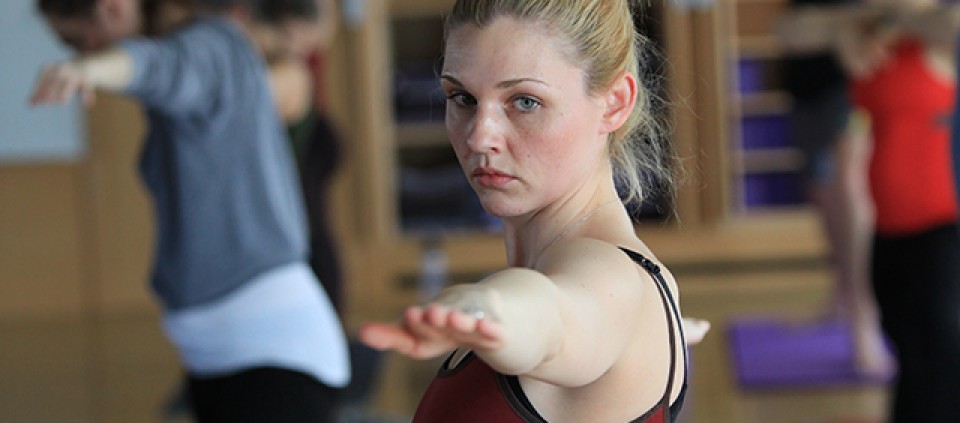Reentry Post-Kripalu, Without the Burn

by Janet Arnold-Grych
On the morning of my 49th birthday, I found myself captivated by the light streaming in through the windows of the Main Hall at Kripalu. Girish was seated a few rows in front of me, playing his guitar and softly singing a chant that floated up to meet the sunshine. Around me were 30 people I did not know, but to whom I could not have felt closer at that moment. Everything was full and rich and perfect. It was a gift I will always remember fondly and for which I will be forever grateful.
I’ve been lucky enough to visit Kripalu maybe half a dozen times. Each visit has shaken me by the shoulders and beckoned me to wake up to the wonder all around. Because I find my Kripalu experiences so meaningful, that first day back at work is often a bit like being underwater—colors and shapes are recognizable, but the overall view is hazy, and moving through simple activities feels foreign. Sometimes I want to hide underwater and pretend that my world is different than it actually is.
It’s not that I return to a hostile environment. In fact, I’m lucky to work for a company that does good things and to engage with colleagues who are cordial. Still, it’s pretty common for me to require a couple of days before I feel I’m on solid ground. While re-entry is less disruptive now, the first time this happened, a few years ago, I was startled. I felt physically, mentally, and emotionally jumbled, and this was only after a long weekend at Kripalu. It wasn’t like I’d visited Mars, so why did I feel as if I were holding my breath?
I think it’s because at Kripalu, the rules change. No one cares what you look like or what you wear. I’ve never once been asked what I do for a living after introducing myself (just try to get through one business event without answering that question). Here, it’s about who you are. That can be terrifying and liberating at the same time, because those outer layers are often the default for how we define ourselves. I’ve found that as external layers of superficiality are released, our commonality and connection to others becomes clear and easy. Your guard isn’t just let down, it’s forgotten.
You can’t immerse yourself that fully and then walk back through the door you came in unchanged. At the same time, for me, it’s not possible to outwardly be exactly the same person I am at Kripalu. I might wish someone a Namaste silently, but say it out loud at work and I’d generate a lot of strange looks.
So the question is how to hold on to that kindness, trust, and authenticity without feeling crushed by an environment that doesn’t support bare feet, whole-food buffets, and complete acceptance. For me, I’ve found the following to be helpful in building a bridge between the Kripalu experience and my everyday life, both at work and at home:
- Expect to feel that stones have shifted beneath your feet.
That feeling is testament to how much of yourself you invested in your time away—and it’s a good thing. Embrace it, even if feels unsettling. That feeling wakes us from the complacency of our typical routines. - Reflect on the time away and allow thoughts and learning to bubble up.
I’ve always found that transferring thoughts to paper or a person helps me to make sense of what’s humming in my head. Those thoughts may come pouring out, or they might trickle out over weeks. Allow them to arise and review them without judgment. - Remain connected to the experience by integrating what feels sacred to you.
Kripalu celebrates that we are more than our physical selves, that life is more than our small definition of it. Doing something that physically and/or mentally serves as your totem to the sacred can keep that feeling alive. Maybe it’s sustaining silence during a slice of the morning or engaging in a meditative walk or choosing to look people in the eye and smile. - Recognize when your reactions support your renewed view. When they don’t, realign.
It’s easy to feel more patient, loving, and open to others at Kripalu. Wakeful attention to interactions with others when not at Kripalu may take a little more effort. Coming back to the breath can help to root your awareness in the present moment and slow things down. This allows you to consciously make the choices that bring your actions into harmony with your intentions. - Embrace gratitude.
Gratitude is good for expanding your vision and tending to what ails you. At Kripalu, I’m filled with gratitude everywhere I turn—gratitude for the people, the place, the feeling. Feeding gratitude can ground you in what is important and serve as a reminder that grace is ever-present.
Applying the above, I feel less like my world is starkly divided into Kripalu and not-Kripalu, even after a visit. Sometimes, when I am in a difficult situation, I think back to a refrain we sang on my birthday weekend as we walked around the room, opening our arms and smiling at each other like old friends: “It’s all good. It’s all good. It’s all good.” And it is.
Janet Arnold-Grych is a yoga teacher and writer whose work has been published in Elephant Journal, Huffington Post, Third Coast Digest, and other outlets. She’s also a marketing manager for a Fortune 200 company.
© Kripalu Center for Yoga & Health. All rights reserved. To request permission to reprint, please e-mail editor@kripalu.org.